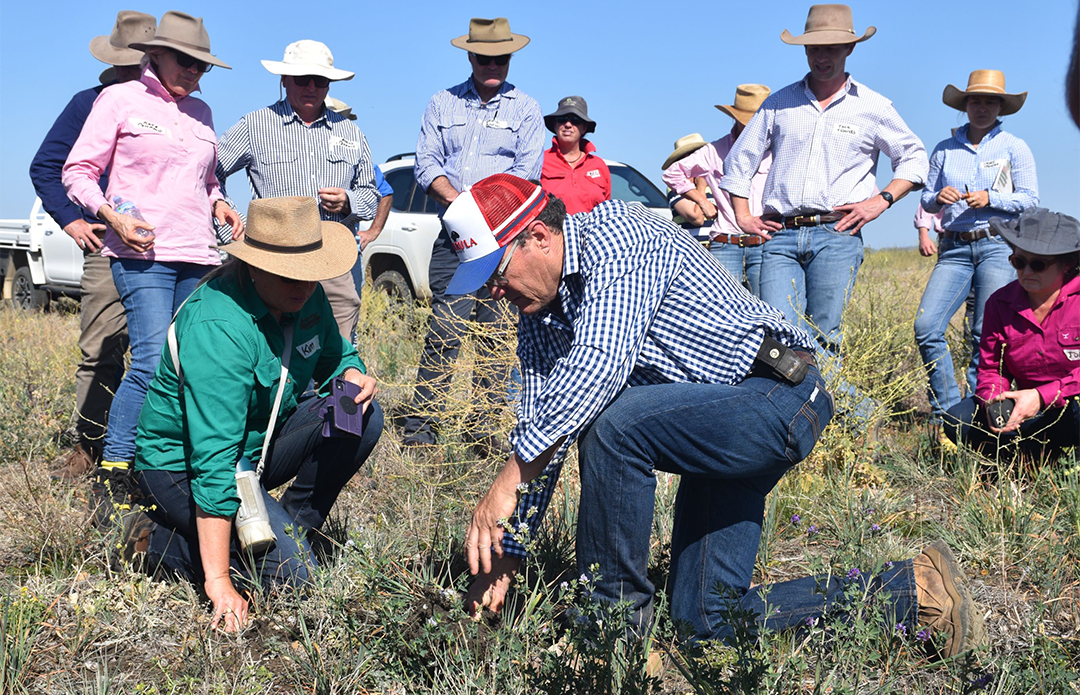Almost 200 producers from across New South Wales are now better equipped to manage future droughts, thanks to a number of recent field days run as part of the University of New England’s (UNE) Overcoming the Knowledge Gaps project.
UNE and collaborating agronomists visited a range of properties located in drought-prone areas to showcase the benefits of implementing deep-rooted legumes as a way to increase farm resilience.

Image: Justin Kirkby (kneeling right) and Kim Deans (kneeling left) examining the soil structure and legume roots in the pasture.
Land regeneration, improved soil health and structure, and increased productive pastures were just a few of the positive outcomes that producers were able to see first-hand during the events.
The property managers and various speakers invited to address the field days emphasised the importance of grazing management to support plant diversity and groundcover – itself an important factor in maximising the value of rainfall, particularly in dry seasons.
“The feedback was overall really positive, and the attendees enjoyed being able to get out and experience the success others have had with legumes as a drought management strategy,” says Associate Professor David McNeill, who is leading the project.

Image: A/Prof David McNeill presenting to producers at the Business of Biodiversity workshop.
“The workshops incorporated activities that asked producers to apply the learnings to their own properties, giving them a really good starting point to actually take action and facilitate change.
“We were also able to give people useful contacts to reach out to, so that we can ensure this is a continuous learning process into the future.”
Overcoming the Knowledge Gaps is funded by the Australian Government’s Future Drought Fund, and has seen over 5000 hectares of contrasting legumes sown across twelve participating properties since work began in early 2023.
Through this, the research team is helping participating producers to identify and address the common constraints that producers often face when trying to implement legumes into their grazing systems.
While implementation can initially be difficult, participating producers have seen how legumes can be resilient in dry conditions, and how they can make a valuable contribution to soil and livestock health.

Image: Collecting soil samples across the properties within the Victoria River District looking to plant tropical legumes over the 23-24 summer monsoon period as part of the project.
“The main message we are trying to get across through the Overcoming the Knowledge Gaps project is that grazing management is essential for productive pastures, and incorporating legumes into your grazing system can be a great way to do this in areas prone to drought.” says Dr McNeill.
“Have a plan and be ready for the right seasonal conditions. To start your plan, begin with a soil test and speak to your local agronomist.”
You can find out more about the Overcoming the Knowledge Gaps project on the UNE website.
Acknowledgements:
Thank you to the following hosts, speakers and organisers who helped make the field days happen:
- Producers/hosts – Justin and Lorroi Kirby, Charlie and Ruth Hickson and property manager John Whittacker, Greg Rummery, Sam and Megan Clifton, the Avendano family (George, Maree, Matt and Richard), Jim Larkin
- Speakers – Dr Judi Earl, Stephen Stacey, Kim Deans, David McNeill, Greg Rummery, Richard Avendano, Jonathon McLachlan
- Organisers - Shelley McDouall (Northern Slopes Landcare), Casey Spencer (UNE), Greg Rummery (OutlookAg), Richard Avendano (Avendano Agronomics), Callen Thompson (AgStar Projects), Dr Jess Monk (UNE).
All events were funded by the Australian Governments Future Drought Fund as part of the Overcoming the Knowledge Gaps project.

